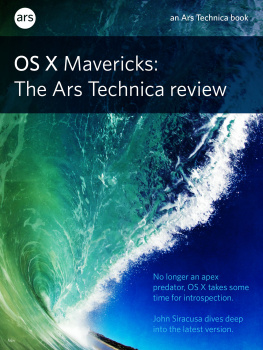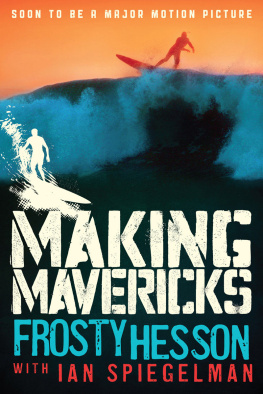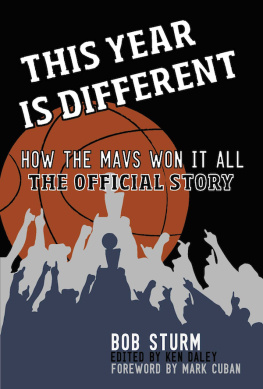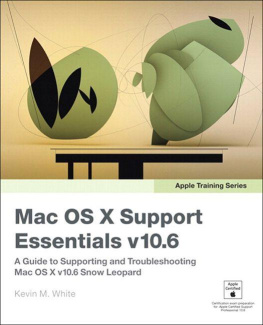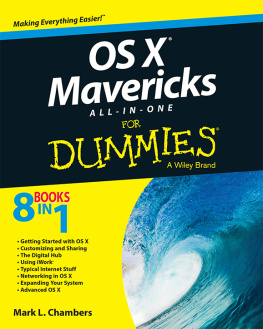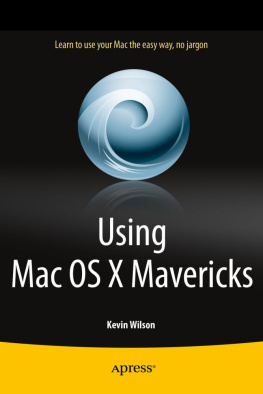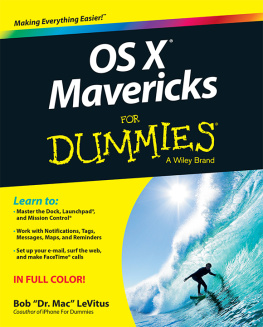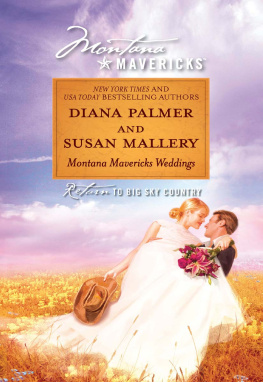John Siracusa - OS X 10.9 Mavericks: The Ars Technica Review
Here you can read online John Siracusa - OS X 10.9 Mavericks: The Ars Technica Review full text of the book (entire story) in english for free. Download pdf and epub, get meaning, cover and reviews about this ebook. year: 2013, publisher: Ars Technica, genre: Computer. Description of the work, (preface) as well as reviews are available. Best literature library LitArk.com created for fans of good reading and offers a wide selection of genres:
Romance novel
Science fiction
Adventure
Detective
Science
History
Home and family
Prose
Art
Politics
Computer
Non-fiction
Religion
Business
Children
Humor
Choose a favorite category and find really read worthwhile books. Enjoy immersion in the world of imagination, feel the emotions of the characters or learn something new for yourself, make an fascinating discovery.
- Book:OS X 10.9 Mavericks: The Ars Technica Review
- Author:
- Publisher:Ars Technica
- Genre:
- Year:2013
- Rating:5 / 5
- Favourites:Add to favourites
- Your mark:
- 100
- 1
- 2
- 3
- 4
- 5
OS X 10.9 Mavericks: The Ars Technica Review: summary, description and annotation
We offer to read an annotation, description, summary or preface (depends on what the author of the book "OS X 10.9 Mavericks: The Ars Technica Review" wrote himself). If you haven't found the necessary information about the book — write in the comments, we will try to find it.
OS X 10.9 Mavericks: The Ars Technica Review — read online for free the complete book (whole text) full work
Below is the text of the book, divided by pages. System saving the place of the last page read, allows you to conveniently read the book "OS X 10.9 Mavericks: The Ars Technica Review" online for free, without having to search again every time where you left off. Put a bookmark, and you can go to the page where you finished reading at any time.
Font size:
Interval:
Bookmark:

John Siracusa has a B.S. in Computer Engineering from Boston University. He has been a Mac user since 1984, a Unix geek since 1993, and has spent the last 16 years as a professional web developer and freelance technology writer. When he's not destroying the Ars Technica CMS with 45,000-word articles, John enjoys gaming, exercising his TiVo, writing open source software, and pining for the pizza and bagels of his childhood home of Long Island, NY. John lives in Newton, Massachusetts with his wife, two children, and an attic full of classic Mac and NeXT hardware.
- Follow John Siracusa on Twitter: http://twitter.com/siracusa
When Hippocrates said that "life is short, art is long," he did not mean that art outlives the artist. The "father of medicine" instead diagnosed a basic fact of life: true art or skill takes a lifetime of effort to perfect, and the path is fraught with "occasional crises, perilous experiences, and difficult judgments." Technology is the "art" at the forefront of our changing world, and we're here to help it all, even the difficult judgments.
At Ars Technicathe name is Latin-derived for the "art of technology"we specialize in original news and reviews, analysis of technology trends, and expert advice on topics ranging from the most fundamental aspects of technology to the many ways technology is helping us enjoy our world. We work for the reader who not only needs to keep up on technology, but is passionate about it.
We at Ars take great pride in our unique combination of technical savvy and wide-ranging interest in the human arts and sciences. Our editorial team is at home on Linux, Mac, and Windows; they know both the home and the enterprise; they understand law and politics; and they specialize in bringing readers the right answer, the first time. It's no wonder that Ars has become a "go-to" destination for those who need to sift the wheat from the chaff.
Ars Technica is also unique in a number of ways. We are a proud leader in conversational media, a new and exciting answer to the reader's need and desire for fresh voices, informed reporting, and reader engagement. Ars writers aren't afraid of wit or strongly-held opinions, and readers find both on display throughout our work. But at Ars, "opinion" never devolves into dogma; we strive for measured judgments and carefully relayed contexts. Those who come to Ars looking for computing religion won't find it, and that's why millions of readers trust our take on the day's tech news and look forward to our original reporting.
Then there's our formidable community. While "community" has lately become a Web buzzword, Ars has been building a real online community since its founding over eight years ago. We encourage reader feedback and participation in conversation via discussion on every article, as well as in the renowned Ars OpenForumone of the Internet's true treasure troves, and one of the largest, documented community databases of tips, technical help, and camaraderie on the planet.
It was once said that sine scientia ars nihil est, that is, "without knowledge, art is nothing." We agree, but there's also a corollary: sine ars, scientia nihil est.
Find Ars Technica elsewhere on the web:
- Twitter: http://twitter.com/arstechnica
- Facebook: http://facebook.com/arstechnica
After a dozen years and nine major releases, OS X has had a full life: the exuberance of youth, gradually maturing into adulthood, and now, perhaps, entering its dotage. When I am an old operating system I shall wear leather?
The 2011 release of OS X 10.7 Lion seemed to mark the natural endpoint of the "big cat" naming scheme. But Apple couldn't resist the lure of the "cat, modifier cat" naming pattern, releasing OS X 10.8 Mountain Lion a year later. Perhaps it just wanted to give its cat nine lives.
The 10th major release, OS X 10.9 Mavericks, is named after an awkwardly plural California surfing spot, finally ending the feline dynasty. But what part of the operating system's existence is this? The afterlife?
When it comes to OS X, many people are suffering from the end-of-history illusion: the belief that while the Mac platform has consistently experienced significant enhancements in the past, it will somehow not continue to grow and mature in the future.
So let's readjust our perspective. Perhaps the first seven big-cat releases were OS X's early childhood: birth, potty training, learning to walk and talk, and so on, culminating in some form of self-actualization.
With Lion, the Mac entered an awkward adolescence, acquiring a newfound concern about what the other kids were doing. Accordingly, OS X's last two releases included several naked attempts to ape the look and feel of its more successful sibling, iOS.
But that was all before last year's ouster of Scott Forstall, senior vice president of iOS Software. By all accounts, Forstall was one of the driving forces behind the iOS aesthetic that Lion and Mountain Lion so enthusiastically embraced. Jony Ive's iOS 7 strikes off in a bold new direction based on a philosophy that Apple is eager to generalize to the company as a wholeleaving OS X holding the stitched-leather bag.
Let's say we accept that this is not the end of history and that OS X will continue to evolve. To what end? Aside from undoing the most egregious peer-pressure-motivated interface changes, what should this first non-cat release of OS X do differently from its predecessors?
One option would be to continue to follow iOS's lead, switching gears from rich textures and simulations of analogous physical products and setting off in pursuit of the new, spare iOS 7 aesthetic. I'll spoil it for you: Apple hasn't chosen this pathnot yet, anyway. Time and resource constraints alone could explain this choice. After all, Apple didn't even have the iPad version of iOS 7 ready in time for WWDC this year. An interface overhaul in Mavericks was clearly out of the question.
Mavericks is also not an internals-only release like Snow Leopard, which famously promised "no new features." There are new features in Mavericks, even new bundled applications.
To some degree, the content of any OS release is determined by what did and didn't make the deadline for the previous release. There are exceptions, like Fusion Drive, which didn't quite make it into Mountain Lion but also couldn't wait for the next major OS release because it was a prerequisite for some new hardware products.
Nevertheless, Apple does try to give each new OS some sort of theme. Mavericks is the first California-themed release of OS X, named after "places that inspire us here in California," according to Craig Federighi, who says this naming scheme is intended to last for at least the next 10 years. The pressure is on for Mavericks to set a new direction for the Mac platform.
According to Apple, Mavericks has a dual focus. Its first and most important goal is to extend battery life and improve responsiveness. Secondarily, Mavericks aims to add functionality that will appeal to "power users" (Apple's words), a group that may be feeling neglected after enduring two releases of OS X playing iOS dress-up.
Is that enough for Mavericks to live up to its major-release version number and to kick off the next phase of OS X's life? Let's find out.
Lion was the first download-mostly release of OS X, and Mountain Lion was the first download-only release. Mavericks breaks no new ground in the realm of product distribution. As expected, it's available only through the Mac App Store.
Font size:
Interval:
Bookmark:
Similar books «OS X 10.9 Mavericks: The Ars Technica Review»
Look at similar books to OS X 10.9 Mavericks: The Ars Technica Review. We have selected literature similar in name and meaning in the hope of providing readers with more options to find new, interesting, not yet read works.
Discussion, reviews of the book OS X 10.9 Mavericks: The Ars Technica Review and just readers' own opinions. Leave your comments, write what you think about the work, its meaning or the main characters. Specify what exactly you liked and what you didn't like, and why you think so.

